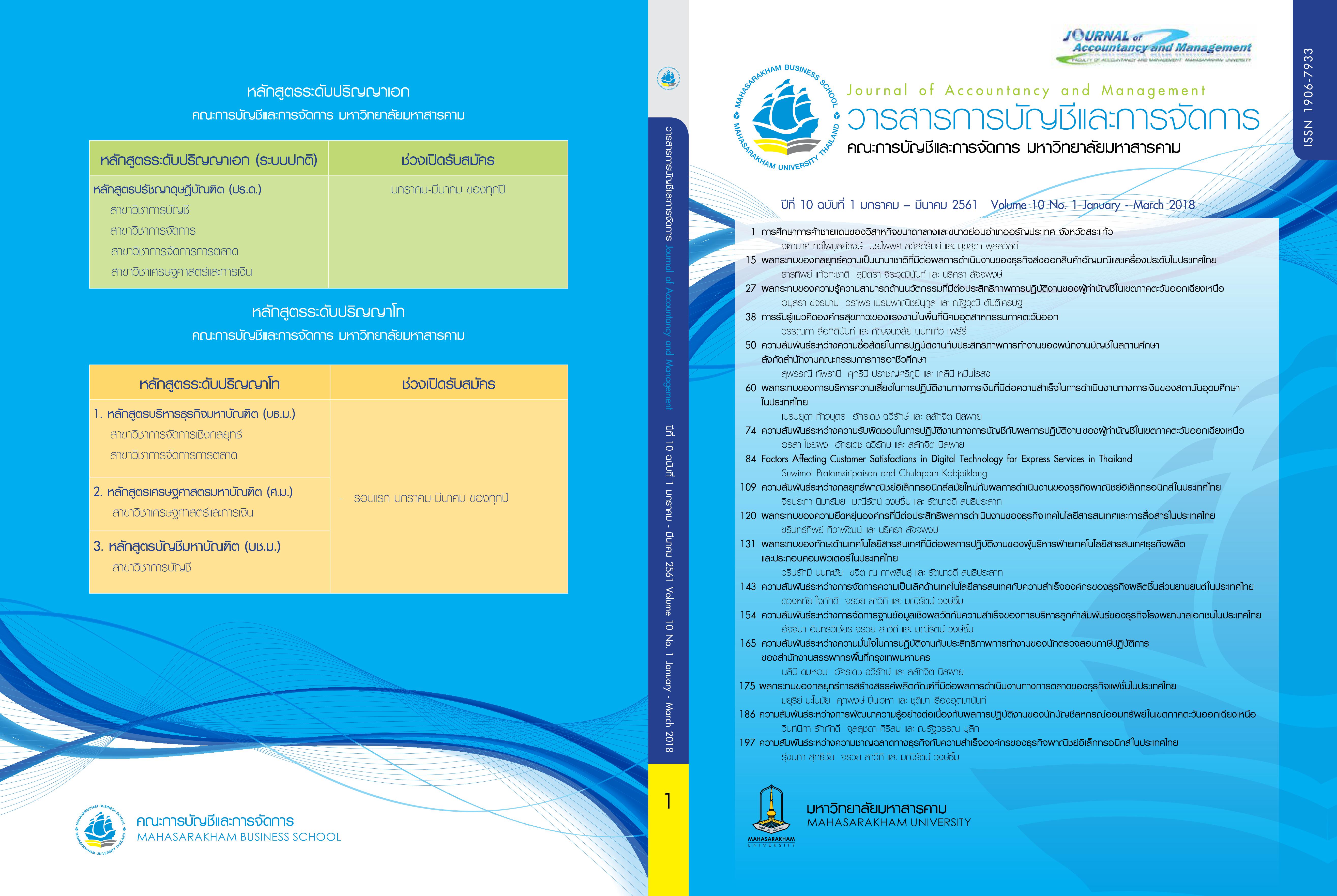Factors Affecting Customer Satisfactions in Digital Technology for Express Services in Thailand
Main Article Content
บทคัดย่อ
Nowadays, people are more and more shifting their consumption to the Web. In logistics
and freight services, shipping and tracking of shipments, which were earlier done by phone or fax,
are now executed in the Web with specific shipping applications. The object of this thesis is to find
out the factors affecting customer satisfactions in digital technology for Express Services in Thailand. The main goal of this research was to discover factors form a user’s perception of an e-commerce application and their effect in digital technology to meet the customers’ needs. The main objectives of these studies were 1. to find out which factors form a user’s perception of an e-commerce application, 2. to find out how the perception can be influenced by an e-commerce application. 3. to learn and understand the needs of the customer who used the express services in Thailand.
Analyzing different technology acceptance theories and factors by the connection between technology acceptance factors and usability definition searched, but eventually only loose connections were discovered. The moderating factors that either strengthen or weaken the importance of the determining factors were gender, age, experience of use. The research methodology using quantitative research for collecting the data by questionnaires to 400 respondents who are the customer using Express Services in Thailand. To the lack of finding and time limitation, this research was only studied with the limited respondents.
The research concluded that the demographic aspect, from 400 of respondents and the researcher found that the majority of the respondents is female for 73.3%, ages range of 31-40 years old for 90.5%, then mostly education level at 89.8% by bachelor’s graduate and most respondents average income per month (in THB) are 15,000 – 35,000 THB at 89.3%. Customer perceptions aspect from 400 of the respondents divided into 4 categories; intention to use, usage behavior and benefits to use. The researcher found that courier services that the respondents use most is Express Services for 92.3%, the respondents using this services at least once a month for 90.5%, the last time to use Express Services is a week ago for 83.8%, the purpose of using courier services is for business for 92.3%, the reason to choosing online Express Services because Brand or Reputation for 71.3% and online express services that the respondents are using is Kerry Express Services for 77.3%. Customer satisfaction affecting in the digital technology to meet the needs of customer who using express services in Thailand so rejected H3 because of the significant level below 0.05 levels. From this
research result found that most of the respondents in Bangkok aren’t satisfied with the online express services by providing their personal information and debit/credit card number so the result would be rejected.
Downloads
Article Details
บทความที่ได้รับการตีพิมพ์เป็นลิขสิทธิ์ของวารสารการบัญชีและการจัดการ
ข้อความที่ปรากฏในบทความแต่ละเรื่องในวารสารวิชาการเล่มนี้เป็นความคิดเห็นส่วนตัวของผู้เขียนแต่ละท่านไม่เกี่ยวข้องกับมหาวิทยาลัยมหาสารคาม และคณาจารย์ท่านอื่นๆในมหาวิทยาลัยฯ แต่อย่างใด ความรับผิดชอบองค์ประกอบทั้งหมดของบทความแต่ละเรื่องเป็นของผู้เขียนแต่ละท่าน หากมีความผิดพลาดใดๆ ผู้เขียนแต่ละท่านจะรับผิดชอบบทความของตนเองแต่ผู้เดียว
เอกสารอ้างอิง
Ahmed, P.K., & Rafiq, M. (2003). Internal market issues and challenges, European Journal of Marketing, 37(9), 1177-1186.
Al-Ghaith, W. A., Sanzogni, L., & Sandhu, K. (2010). Factors influencing the adoption and usage of online services in Saudi Arabia. The Electronic Journal of Information.
Bennett, R., & Thiele, S. R. (2004), Customer satisfaction should not be the only goal. Journal of Services Marketing,18(7), 514-523.
Bergman, B., & Klefsjö, B. (2010). Quality from customer needs to customer satisfaction, Studentlitteratur AB, Lund, Sweden.
Berry, L. L., & Parasuraman, A. (1991). Marketing to existing customers, in marketing service: competing trough quality, The Free Press, New York.
Deutsche Post DHL official website, DHL employee: http://www.dp-hl.com/en/responsibility/employees/
engaging_in_dialog_with_our_employees.html, Access date: 2016, 04, 20.
Deutsche Post DHL official website, DHL health management: http://www.dp-dhl.com/en/responsibility/
employees/health_management.html, Access date: 2016, 04, 28.
DHL official website: http://www.dhl.com/en.html, Access date: 2016, 04, 25.
DHL Supply Chain GOGREEN 2011:http://www.dhl.com/en/logistics/ freight transportation/go_green.html, Access date: 2016, 04, 26.
Doyle, P., & Wong, V. (1998), Marketing and competitive performance: an empirical study, European Journal of Marketing, 32(516), 514-535.
FedEx official website: http://www.fedex.com/us/index.html, Access date: 2016, 05, 03.
FedEx official website, sustainability goals: http://www.fedex.com/us/smallbusiness/ updates/june2010/fedex-sustainability.html, Access date: 2016, 05, 03.
Gerhardt, P. L. (2002), A paper presented in partial fulfillment of the requirements of OM 814 marketing strategy and practice. Journal of Service Marketing, 20(8), 150-160.
Grönroos, C. (2000), Service management and marketing: A customer relationship management approach, Wiley, Chichester.
Heding, T., Knudtzen, C. F., & Bjerre, M. (2008), Brand Management - Research, Theory and Practice. u.o.: Routledge.
Hyder, A. S., & Abraha, D. (2003), Strategic alliances in Eastern and Central Europe, Pergamon, An Imprint of Elsevier Science. United States of America.
Johnson-George, C., & Swap, W. C. (1982). Measurement of specific interpersonal trust: Construction and validation of a scale to assess trust in a specific other. Journal of Personality and Social Psychology, 43(6), 1306.
Jordan, G. J., & Fortin, M-J. (2002), Scale and topology in the ecological economics sustainability paradigm. Econogical Economics, 41(2), 361-366.
Kerry Express official website: http://www.kerryexpress.com/#kexpress, Access date: 2016, 05, 03.
Kerry Express official website, e-commerce: http://www.kerryexpress.com/# ecommerce, Access date 2016, 05, 03.
Koh, S. C. L. T. (2005). Using e-commerce to gain a competitive advantage in 3PL enterprises in China, International Journal of Logistics Systems and Management, 1(2), 187-210.
Kolter, P., Armstrong, G., Wong, P.V., Saunders, P.J., & Wood, M. B. (2010), Principles of marketing pack (5th ed.). Financial Times/ Prentice Hall. London.
Lieb, R. C. (2005), The 3PL industry: where it's been, where it's going, Supply chain management review, 9(6), 20-27.
Nadin, S. J., & Williams, C. C. (2012). Psychological contract violation beyond an employees' perspective: The perspective of employers. Employee relations, 34(2), 112-120.
Storbacka, K., & Lehtinen, J.R. (2001) Customer relationship management: Creating competitive advantage through win-win relationship strategies. Singapore : McGraw-Hill.
AlGhamdi, R., Drew, S., & AlFaraj, O. (2011). Issues influencing Saudi customers’ decisions to purchase from online retailers in the KSA : A qualitative analysis. European Journal of Scientific Research. 55(4), 580-593.
Thailand Post Office official website: http://www.thailandpost.com/index.php?page= intro&language=en, Access date: 2016, 06,18.


